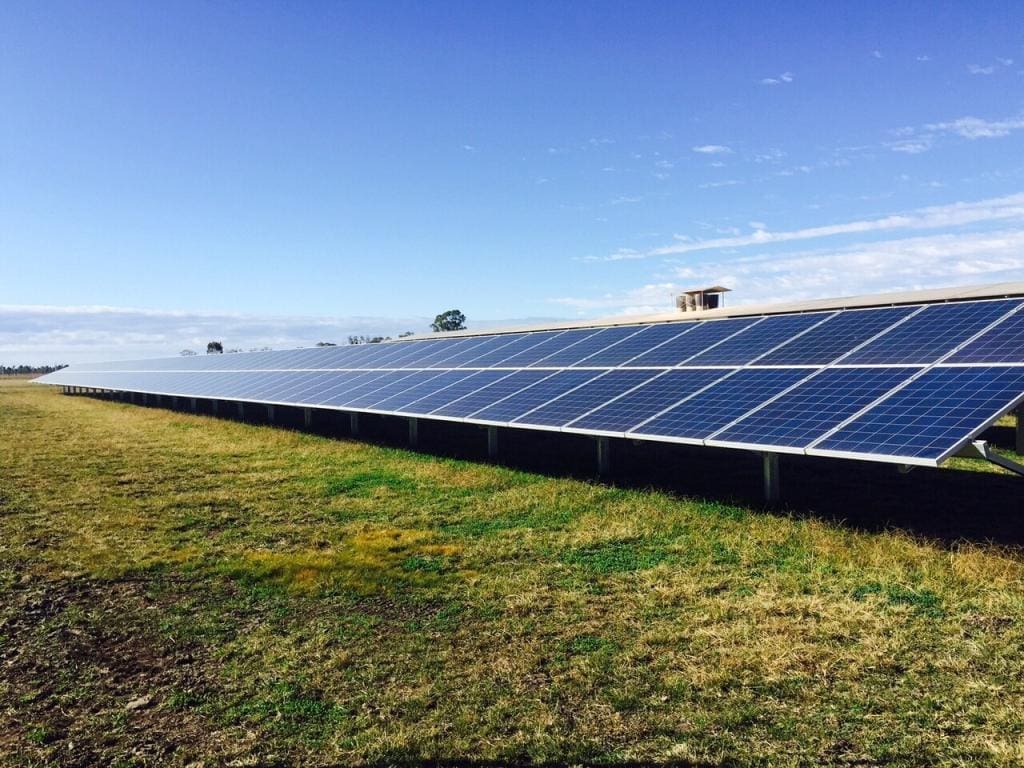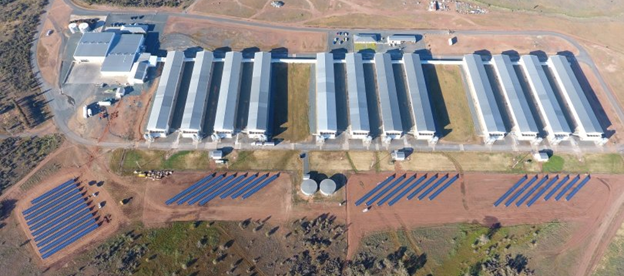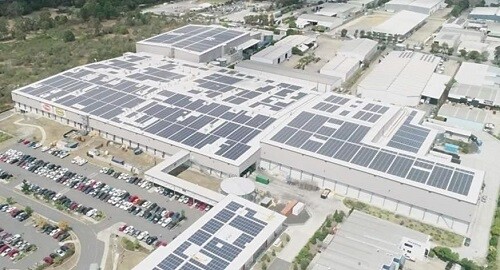Systems over 100kW in size are considered a ‘power station’ meaning these systems create large-scale generation certificates which can be sold at the end of each year of production. Behind-the-meter rooftop and ground-mounted solar power systems are generally considered the cheapest way to power a site during the daytime and can offer attractive energy savings.
Pricing for 1MW (1,000kW) solar systems
The cost of installing a solar system has fallen significantly in recent years thanks to a number of factors, including Australian government incentives for renewable energy, growing competition between solar panel installers and component manufacturers, and global manufacturing trends.
Through our database, Solar Choice has live quote pricing data for 1MW systems across all states of Australia. As an indicative guide, 1MW solar power systems can start as cheap as $1,100,000 for a straightforward installation with cost-effective products.
There are some common factors that can influence the price of an installation:
- Quality, brand reputation of solar products and solar installation companies used
- Ground-mounted arrays cost more than rooftop installations with additional mounting requirements
- Long AC or DC cabling distances (>50m)
- Requirements to trench and backfill
- Concrete, Klip-lok or partly shaded roofs
To see average system prices for commercial system sizes up to 100kW see the Solar Choice Commercial Solar PV Price Index.
Compare 1MW indicative quotes from leading commercial installers
1.7MW Solar project for Pace Farms
(Project tender managed by Solar Choice Commercial.)
To see more photos of commercial installations managed by Solar Choice, visit our Tender Management page.
Energy yields for 1MW solar systems
There are many factors that influence the output of solar PV systems. These include the orientation and tilt angle of the solar panels, the presence or absence of shading, average system operating temperature, and the quality of the system’s components. All of these factors are taken into consideration when a system is designed in order to arrive at a reasonable estimate as to what that system’s power output will be once it is operational.
As a very rough guide, a system in Australia will produce 4 kilowatt-hours (kWh) per kW of installed capacity per day, averaged throughout the year. This figure will of course be higher in sunnier locations and lower in less sunny spots (Brisbane sees more sunlight than Hobart, for example) and the season (power generation is higher in the summer thanks to the longer days).
As an example:
A standard 1MW solar system in Sydney, NSW would produce about (3kWh x 1,000kW =) 3,000kwh on a winter’s day, while in the peak of summer, the same 1MW solar PV system would produce around (5kWh x 1,000kw =) 5,000kwh. A similar system in Brisbane might produce as much as 3,500kWh in winter and 5,500kWh on a day in summer.
3.2 MW Rooftop Solar PV array for Primo Smallgoods, Wacol QLD
(Read more about this project. Project tender managed by Solar Choice Commercial.)
Financial returns for 1MW solar systems
According to Solar Choice data – payback periods for small LGC commercial-scale solar systems in Australia are around 5 years on average, with internal rates of return (IRR) easily hitting 20%
in every state & territory in the country.
That being said, the investment case for installing a 1MW solar system depends on the circumstances. The 5 biggest factors that influence Commercial Solar ROI are:
- Energy consumption matching daylight hours
- Roof structure and material
- Getting a competitive price via a solar tender
- Roof Slope and Azimuth
- Existing rates negotiated with the electricity retailer
Commercial Solar System Finance Options
There are a number of different solar financing options available to businesses that can create a cash flow positive solution from the commencement of the project with zero upfront costs
required. Different terms, fixed/variable repayments and ownership models exist and it is recommended to consider all options prior to making a decision.
Solar Choice has independently assessed the pros and cons of the different options available in our Commercial Finance Guide.
Run a Solar Tender for your large-scale Commercial Solar Project
The best way to get a high-quality solution and attract innovation from Australia’s leading commercial installers is by running a Solar Tender. Solar Choice has managed tenders across many of Australia’s largest Solar PV installations enabling clients to attract ALL major commercial installers in Australia to put together their best proposals.
Solar Choice via their free tender management platform helps design the optimal solar solution, invites the best-fit accredited installers to participate, prepares an apples-for-apples comparison across multiple proposals and provides independent expert advice on products, system design, warranties and financing options.
To find out more about the Solar Choice Solar Tender Management Process contact Jeff Sykes, Chief Strategist at jeff@solarchoice.net.au.
Request a free solar business case and compare leading commercial installers
Since 2008 Solar Choice has consulted with over 3,000 businesses around Australia and helped develop over 800MW solar commercial and solar farm projects.
Compare Prices and installer options for 250kW & 500kW
- Solar Panel Costs: Solar Choice Price Index | April 2025 - 1 April, 2025
- Solar Panels For Homes – All You Need to Know About Solar Systems - 18 March, 2025
- Best NSW Solar Feed-In Tariffs - 17 March, 2025



First of all it’s a informative post. Thanks for sharing this post. It is very helpful.